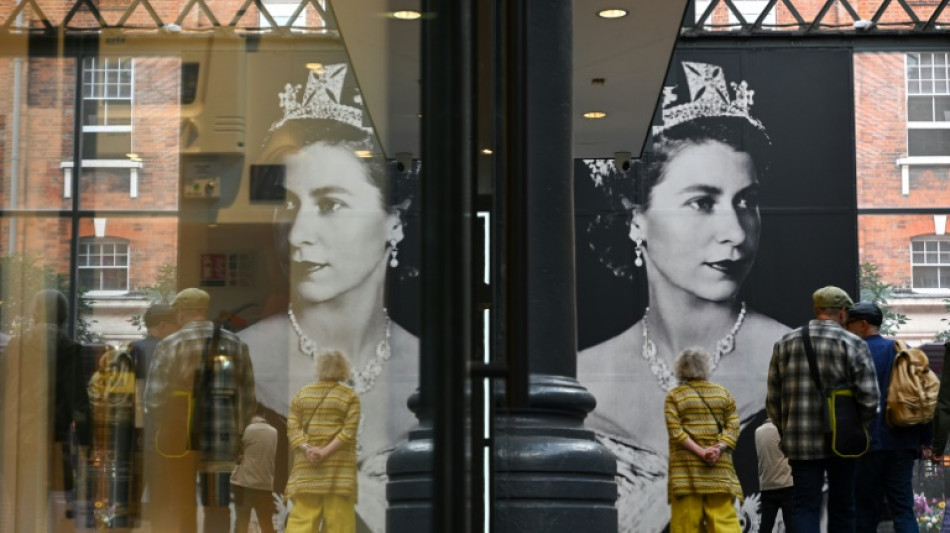
-
 Stock markets mainly lower on China, US economy fears
Stock markets mainly lower on China, US economy fears
-
Former Ubisoft bosses on trial in France over alleged harassment

-
 Strike action grounds thousands of flights in Germany
Strike action grounds thousands of flights in Germany
-
Trump says US in talks with four groups over TikTok sale

-
 Hong Kong, Shanghai lead losers on mixed day for markets
Hong Kong, Shanghai lead losers on mixed day for markets
-
'Got cash?' Tunisians grapple with new restrictions on cheques

-
 Russian disinformation 'infects' AI chatbots, researchers warn
Russian disinformation 'infects' AI chatbots, researchers warn
-
'Quite sad': Renters turn to lottery in Spain's housing crisis

-
 Indonesians seek escape as anger rises over quality of life
Indonesians seek escape as anger rises over quality of life
-
Iran says won't negotiate under 'intimidation' as Trump ramps up pressure

-
 7-Eleven, Couche-Tard explore sell-offs ahead of potential merger
7-Eleven, Couche-Tard explore sell-offs ahead of potential merger
-
Trump admin detains pro-Palestinian campus protest leader

-
 Japan auctions emergency rice reserves as prices soar
Japan auctions emergency rice reserves as prices soar
-
Hong Kong, Shanghai lead losers on mixed day for Asian markets

-
 China-US trade war heats up as Beijing's tariffs take effect
China-US trade war heats up as Beijing's tariffs take effect
-
7-Eleven to explore sell-offs with Couche-Tard ahead of potential merger

-
 'So important': Selma marks 60 years since US civil rights march
'So important': Selma marks 60 years since US civil rights march
-
Black comedy from award-winning 'Parasite' director tops N.America box office

-
 EU chief sees US as 'allies' despite 'differences'
EU chief sees US as 'allies' despite 'differences'
-
French research groups urged to welcome scientists fleeing US

-
 Journalist quits broadcaster after comparing French actions in Algeria to Nazi massacre
Journalist quits broadcaster after comparing French actions in Algeria to Nazi massacre
-
Highlights from Paris Women's Fashion Week

-
 US ends waiver for Iraq to buy Iranian electricity
US ends waiver for Iraq to buy Iranian electricity
-
China-US trade war heats up with Beijing's tariffs to take effect

-
 Greenland's Inuits rediscover their national pride
Greenland's Inuits rediscover their national pride
-
Floods, mass power cuts as wild weather bashes eastern Australia

-
 Wild weather leaves mass blackouts in Australia
Wild weather leaves mass blackouts in Australia
-
China consumption slump deepens as February prices drop

-
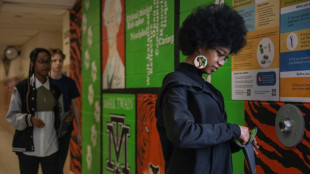 Phone bans sweep US schools despite skepticism
Phone bans sweep US schools despite skepticism
-
Some 200 detained after Istanbul Women's Day march: organisers

-
 'Grieving': US federal workers thrown into uncertain job market
'Grieving': US federal workers thrown into uncertain job market
-
Remains of murdered Indigenous woman found at Canada landfill

-
 Women will overthrow Iran's Islamic republic: Nobel laureate
Women will overthrow Iran's Islamic republic: Nobel laureate
-
Women step into the ring at west African wrestling tournament

-
 Trump's tariff rollback brings limited respite as new levies loom
Trump's tariff rollback brings limited respite as new levies loom
-
Hackman died of natural causes, a week after wife: medical examiner

-
 Oops, we tipped it again: Mission over for sideways US lander
Oops, we tipped it again: Mission over for sideways US lander
-
Cyclone Alfred downgraded to tropical low as it nears Australia

-
 Global stocks mixed as Trump shifts on tariffs weighs on sentiment
Global stocks mixed as Trump shifts on tariffs weighs on sentiment
-
Trump says dairy, lumber tariffs on Canada may come soon

-
 Trump cuts $400 mn from Columbia University over anti-Semitism claims
Trump cuts $400 mn from Columbia University over anti-Semitism claims
-
US Fed chair flags policy uncertainty but in no rush to adjust rates

-
 Adopted orphan brings couple 'paradise' in war-ravaged Gaza
Adopted orphan brings couple 'paradise' in war-ravaged Gaza
-
Oops, we tipped it again: Mission over for private US lander
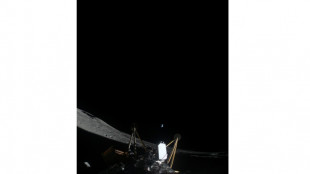
-
 Greenland's mining bonanza still a distant promise
Greenland's mining bonanza still a distant promise
-
Pope 'stable' as marks three weeks in hospital with breathless audio message
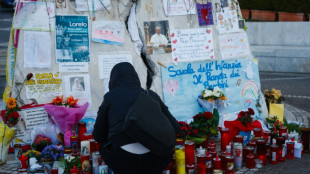
-
 Shares slump on Trump tariffs tinkering, jobs
Shares slump on Trump tariffs tinkering, jobs
-
Mission over for private US lander after wonky landing
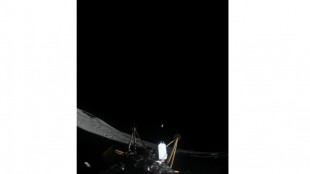
-
 Thousands stranded as massive WWII bomb blocks Paris train station
Thousands stranded as massive WWII bomb blocks Paris train station
-
UK court cuts longest jail terms on activists, rejects 10 appeals


How queen’s death followed a disinformation playbook
The death of Queen Elizabeth II has laid bare a blueprint for how disinformation flourishes around major news events, with bad actors taking advantage to grab attention and sow confusion.
As Britain mourned its longest reigning monarch, social media users shared digitally altered photos and other misleading content, blaming her death at 96 on causes other than old age -- including Covid-19 vaccines and Hillary Clinton.
But the misinformation tactics deployed after Buckingham Palace's announcement on September 8 were mainly old tricks remodeled to fit the current story and make falsehoods stick in people's minds.
Similar bogus claims spread after other big stories, such as Russia's war on Ukraine and Jeffrey Epstein's death, with the QAnon conspiracy movement also showing its hand.
"Familiarity leads to increased believability," said Gordon Pennycook, a behavioral scientist at the University of Regina, in Canada.
- Well-worn tactics -
Warning signs of disinformation sprang up as soon as the queen went under medical supervision, when imposter Twitter accounts disguised as news outlets published and relayed false updates on her status.
The pace accelerated once the palace announced her death.
"People all around the world were aware of and impacted by the queen's death, giving purveyors of misinformation a virtually limitless range of false narratives to choose from," said Dan Evon at the nonprofit News Literacy Project (NLP).
Among the deluge: a months-old video of dancers outside Buckingham Palace was passed off as an Irish celebration of the death. A fake social media post purported to show former US president Donald Trump claiming the queen knighted him. A manipulated photo made it look like Meghan Markle wore a T-shirt saying, "The Queen Is Dead."
Some blamed the queen's death on Covid-19 shots -- an allegation anti-vaccine advocates have made about well-known people who died, including actress Betty White and comedian Bob Saget.
Others named Clinton as the culprit, claiming the queen announced before dying that she had political dirt on the former US presidential candidate and secretary of state.
That made-up statement has been attributed to other world leaders. It is a long-running meme that plays off a conspiracy theory about the Clintons killing political opponents.
"When big events happen, people in different communities, particularly activists, try to figure out if there is an angle for them there," said Mike Caulfield, a research scientist at the University of Washington's Center for an Informed Public (CIP).
"For an anti-vaccine activist, they figure out if the death can be mapped to vaccines. For a (New World Order) conspiracy theorist, maybe they map to Clinton or Epstein."
Supporters of QAnon folded the queen's death into their beliefs about a cabal of child sex traffickers, floating a range of baseless claims and hailing the event as proof of the legitimacy of their movement.
"The royal family, given Prince Andrew's heavily reported connections with Jeffrey Epstein, have always been fodder for the QAnon crowd," said Rachel Moran, a postdoctoral scholar at the CIP.
One video popular in QAnon circles, which some supporters claimed showed a naked boy escaping Buckingham Palace, was actually an old promo for a fictional TV show.
But it spread on TikTok, one of several QAnon-adjacent narratives that reached the mainstream.
In the week after the queen's death, media intelligence firm Zignal Labs tracked more than 76,000 mentions of the late monarch that referenced Epstein and his accomplice Ghislaine Maxwell -- both convicted sex offenders -- on social media, websites, broadcast and traditional media.
Narratives linking the queen to pedophilia, Clinton and the vaccines were mentioned 42,000, 8,000 and 7,000 times, respectively.
- Avoiding misinformation -
The rolling news about the queen -- and her global influence -- explains some of the appeal of conspiracy theories about her death, said Karen Douglas, a social psychology professor at the University of Kent who studies why people believe such theories.
"Accepting mundane explanations for such a big event might be less convincing or appealing," she said.
But there are ways to resist falling for false information.
Media literacy organizations, including NLP and CIP, recommend cross-referencing online posts against trusted information sources and pausing before sharing.
"Even a few moments of reflection can often make a big difference," Pennycook said.
O.Hansen--CPN


